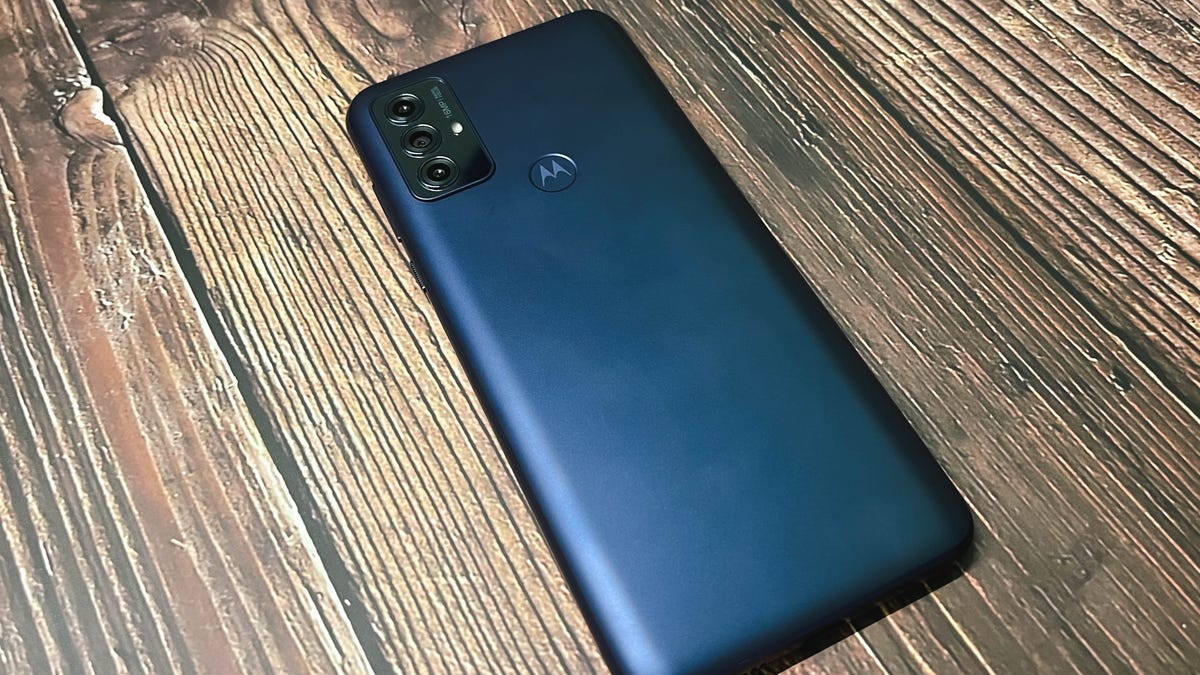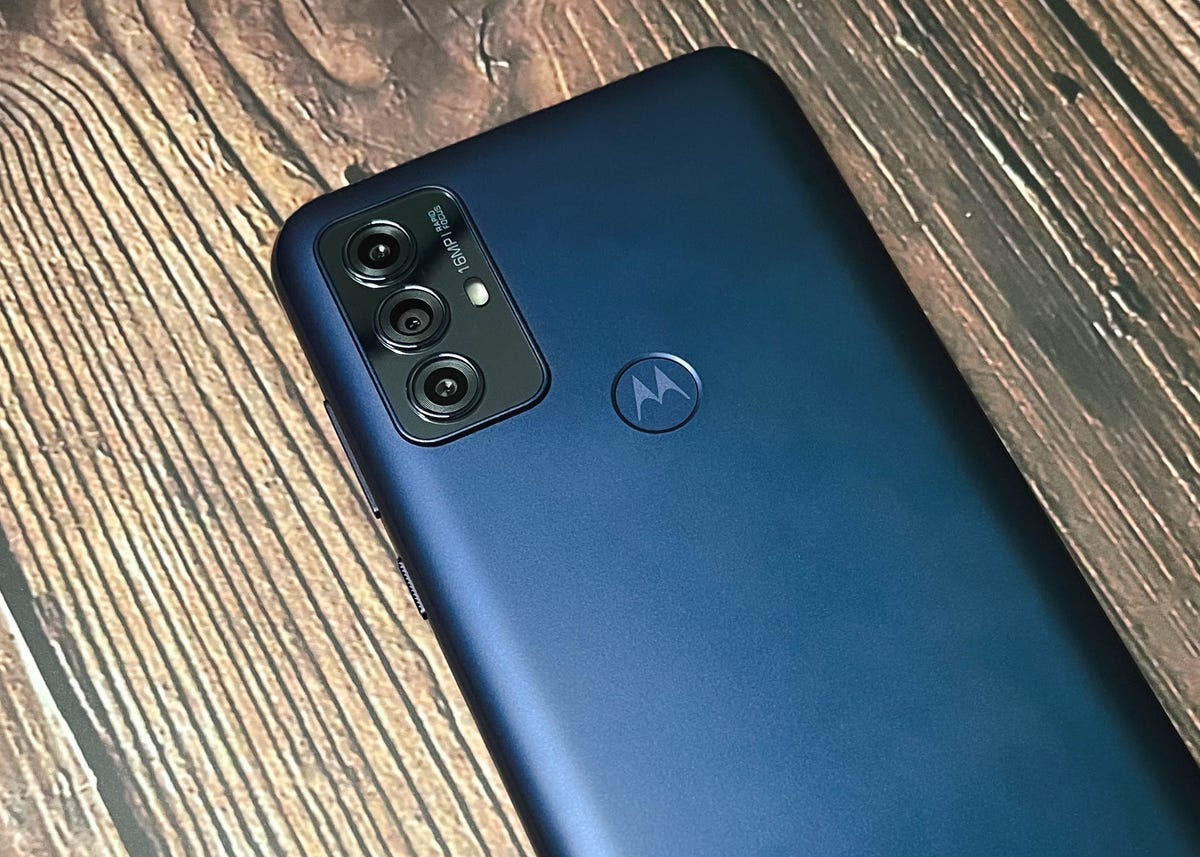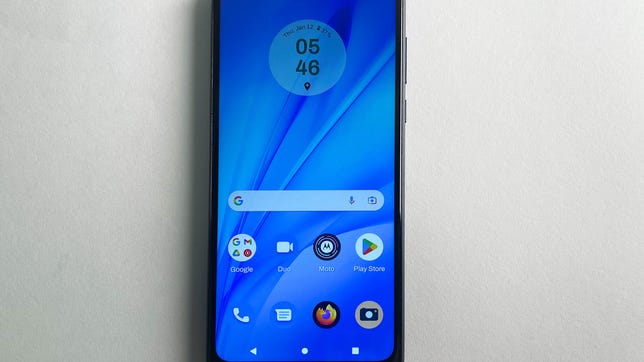Technologies
Moto G Play (2023) Review: Low Price, Lots of Compromises
The essentials-only Motorola phone cuts to the bone in order to hit its $170 price.

The Moto G Play for 2023 costs $170 (or even less at Amazon), making it one of the cheapest new phones you can get right now, and without the bloatware or wireless carrier restrictions we sometimes see on lower-priced devices. With a decent set of specs for the price — including a triple camera system with a 16-megapixel main camera, a 6.5-inch display with a 90Hz refresh rate and a 5,000-mAh battery that provides nearly three days of battery life — this should have been an attractive option for anyone looking for a decent, no-frills phone.
However, this phone has a number of performance issues that make it frustrating to use. And on top of that, Motorola chose to drop one of its best Moto gestures: twisting the phone to quickly open its camera. While some might consider these gestures a gimmick, they have been a signature element of Motorola’s phones for nearly a decade. Other gestures like «chop to turn on flashlight» are still here, making the absence of the camera gesture even more glaring.
Despite these important drawbacks, the 2023 Moto G Play does have some positive attributes. The battery life is great, the software is a fairly clean version of Android 12 and you’ll find rare ports like a headphone jack and microSD card slot for storage expansion. But the phone will only get one major software update to Android 13, which is less than I’d like to see but typical for this price range, as well as three years of security updates.
Yet every perk I list comes with another problem, which is important to consider if you’re tempted by the Moto G Play because of its low price.
Like
- Long battery life
- Clean version of Android 12
- Three years of security updates
Don’t Like
- Frequent lag, issues loading software
- Questionable refresh rate
- No «twist to open camera» gesture
Moto G Play design and performance
The Moto G Play looks nice for a phone that costs just $170. The Navy Blue color of its plastic body provides a hint of personality, while the phone’s low-resolution 720p display includes a screen cutout for the 5-megapixel front-facing camera. The fingerprint sensor is located in my favorite spot on an Android phone — the back.
But the problems begin once you start using the phone. The phone’s MediaTek Helio G37 processor and 3GB of RAM weren’t powerful enough to juggle multiple apps easily. In some cases, it wouldn’t even load certain apps. This was particularly bizarre considering it loaded a 3D game like Crazy Taxi (admittedly an oldie but still a goodie), but couldn’t run other modern 2D games like Exploding Kittens. With the phone’s tiny 32GB of storage, I’m lucky to even fit a couple games onto the Moto G Play, although there is a microSD card slot for storage expansion.
Geekbench V.5.0 single-core
Note:
Longer bars indicate better performance
Geekbench V.5.0 multicore
Note:
Longer bars indicate better performance
Email, news and video-streaming apps fared better in terms of performance, but not by much. Even though the Moto G Play touts a 90Hz refresh rate, which should smooth out animations, there is a lot of noticeable lag. I couldn’t even tell when the refresh rate reached 90Hz. The Settings menu lets you choose between «Auto» and «60 Hz,» with the former dynamically changing the refresh rate based on what you are doing. Having an auto setting does make sense, but a lot of the cheaper Android phones I’ve used also include the option to set the phone to a consistent 90Hz, alongside a 60Hz option for preserving battery life.
This brings me back to the phone’s 5,000-mAh battery — a bright spot considering it easily lasted two days on a full charge during my testing. I think it’s possible for the battery to make it to a third day, mostly because of how underpowered this device is. I typically got around three hours of screen time per day on the device during my testing, which included streaming, shooting photos and trying to play games for this review.
During a more active session on the phone, in which I streamed 22 minutes of a TV show at 100% brightness and then took a 24-minute video call, the battery dropped from 59% to 46%. On less active days, in which the phone was used primarily for listening to music while commuting, reading news articles and light texting, I could end the day with just over 50% remaining.
Charging times for the phone are generally less impressive than battery life. With the included 10-watt charger, it typically took just over an hour to charge from zero to 50%. Getting to 100% would take just over 2 hours, 30 minutes. When I tested charging speeds with my 18-watt charger, the results were slightly faster. The phone would get from zero to 66% after an hour and finish charging just past the two-hour mark.


The Moto G Play has three cameras, anchored by a 16-megapixel main camera.
Mike Sorrentino/CNETMoto G Play cameras
The Moto G Play has a triple-camera system anchored by a main 16-megapixel camera, which is accompanied by a 2-megapixel macro camera and a 2-megapixel depth sensor. But photos are consistently fuzzy, whether I took them indoors, outdoors, in bright environments or in the dark.


A foggy day in New York, taken on the Moto G Play.
Mike Sorrentino/CNETWhile it was nice to see Portrait mode on a phone at this price, I can barely see much of a bokeh effect in my photos. This is especially true when using the 5-megapixel front-facing camera, in which my photos looked consistently muddy.


My friend took a photo of me at the Taco Bell in Times Square using Portrait Mode, but it’s challenging to see if it made a difference.
Mike Sorrentino/CNET

The Moto G Play’s front-facing camera had a tough time keeping me in focus, even in a restaurant with decent lighting.
Mike Sorrentino/CNETI took the Moto G Play with me to Taco Bell — because yes, I’m going to go eat cheap food while reviewing a cheap phone. I had my friend take photos of me using the phone’s Portrait setting. You can sort of see a light blurring effect in the background, but it’s hard to perceive.
In another selfie taken at a restaurant with better lighting than the Taco Bell, I found the selfie camera to have a tough time keeping me in focus.
And when taking photos of my friend’s dog Daisy, the rear cameras struggled to capture much detail of her fur, even when she sat still. In the best of conditions, the phone’s cameras struggle to take sharp photos.


Daisy the dog sat relatively still for this photo, but the Moto G Play’s camera captures minimal detail.
Mike Sorrentino/CNETI compared the photos taken on the Moto G Play against the same images taken on the $160 Samsung Galaxy A03S, and found the picture quality to be roughly comparable for simple static shots. When shooting a bookshelf at CNET’s office, the Moto G Play got slightly more detail of the book covers than the Galaxy A03S, with the latter phone’s image appearing a bit darker.
However, when it comes to a photo with lots of detail and color, such as with this plant wall, the Moto G Play struggles to discern between the different shades of green. Meanwhile the Galaxy A03S performs much better with discerning the darker green shades from the lighter ones, making for a dramatically different photo.
Neither phone’s camera performs especially well, which is a common theme among phones that cost under $200. For me, this places the Moto G Play’s camera photos squarely into the category of being acceptable for group chats, but not much else. It’s going to take a lot of really good lighting and steady hands in order to make the most of these cameras, and that’s more effort than most people are going to want to make.
There are better options, even when you want to save money
Even when you’re looking for the cheapest possible phone, your device still needs to run most apps without issue and take decent-looking photos. I wouldn’t expect a phone that costs less than $200 to run Fortnite at the highest graphics settings, but I am expecting to use apps with minimal lag. While phones at this price are also typically lighter on features, the perks that are available should bring noticeable value to the experience. The Moto G Play’s Portrait mode and high refresh rate don’t succeed in this regard.
Instead of buying the Moto G Play at $170, you’re probably better off saving $10 and getting the $160 Samsung Galaxy A03S. While that phone also has unimpressive cameras, it was at least able to multitask more easily.
Although I haven’t reviewed it yet, you might also consider the $199 Samsung Galaxy A14 5G, since it has 64GB of storage and 5G connectivity. Later this year, a number of TCL 40 phones will arrive in the US, which will include 5G and 128GB of storage for under $200. Those devices might be worth waiting for if you aren’t in dire need of a cheap phone right now.
Moto G Play (2023) vs. Samsung Galaxy A03S, TCL Stylus 5G, OnePlus Nord N300 5G
| Moto G Play (2023) | Samsung Galaxy A03S | TCL Stylus 5G | OnePlus Nord N300 5G | |
|---|---|---|---|---|
| Display size, type resolution, refresh rate | 6.5-inch IPS TFT LCD; 1,600×720 pixels; 90Hz refresh rate | 6.5-inch LCD; 1,600×720 pixels | 6.81-inch; 2,400×1,080 pixels | 6.56-inch IPS LCD display; 720p resolution; 90Hz refresh rate |
| Pixel density | 269ppi | 269ppi | 395ppi | 269ppi |
| Dimensions (inches) | 6.58 x 2.95 x 0.36 in | 6.5 x 2.9 x 0.3 in | 6.67 x 3.01 x 0.35 in | 6.4 x 2.9 x 0.3 in |
| Dimensions (millimeters) | 167 x 77 x 9.4 mm | 165.8 x 75.9 x 9.1 mm | 169.6 x 76.5 x 8.9 mm | 163.8 x 75.1 x 7.99 mm |
| Weight (ounces, grams) | 203 g (7.16 oz) | 202g (7.13 oz) | 213g (7.51 oz) | 190g (6.7 oz) |
| Mobile software | Android 12 | Android 11 | Android 12 | Android 12 |
| Camera | 16-megapixel (main), 2-megapixel (macro), 2-megapixel (depth sensor) | 13-megapixel (main), 2-megapixel (depth), 2-megapixel (macro) | 50-megapixel (main), 5-megapixel (wide), 2-megapixel (macro), 2-megapixel (depth sensor) | 48-megapixel (main), 2-megapixel (depth lens) |
| Front-facing camera | 5-megapixel | 5-megapixel | 13-megapixel | 16-megapixel |
| Video capture | 720p at 30 fps | 1080p at 30fps | 1080p at 30fps | 1080p at 30fps |
| Processor | MediaTek Helio G37 | Octa-core processor | MediaTek Dimensity 700 5G | MediaTek Dimensity 810 |
| RAM, storage | 3GB + 32GB | 3GB/32GB | 4GB/128GB | 4GB/64GB |
| Expandable storage | Up to 512GB | Up to 1TB | Up to 2TB | Up to 1TB |
| Battery, charger | 5,000 mAh; 10W charging | 5,000mAh; charger not included, does not support wireless charging | 4,000mAh; 18W charging | 5,000mAh; 33W charging |
| Fingerprint sensor | Rear | Side | Side | Side |
| Connector | USB-C | USB-C | USB-C | USB-C |
| Headphone jack | Yes | Yes | Yes | Yes |
| Special features | 3-day battery life, Moto Gestures, Auto Smile Capture, Portait Mode | Stylus with built-in storage, producitivity software, NxtVision HDR mode | Dual speakers, NFC, Face Unlock, HDR, Portrait, Face retouching | |
| Price off-contract (USD) | $170 | $160 | $258 | $228 |
Technologies
If You Miss MTV and Dunkaroos, This Indie Game Is for You
Mixtape is an upcoming game about being a teenager when «everything meant the end of the world or the start of the world.»

At a record store in northern Los Angeles, I walked past racks of albums, a DJ spinning records and a stack of Dunkaroos, a cookies and icing snack that was all the rage in ’90s America. It felt like stepping back into an earlier era, the same one backdropping the upcoming game Mixtape, a story about a group of self-mythologizing teens hanging out before life pulls them away from their suburban American town.
In an amusing twist of fate, the main brain behind the game is an Australian rocker who didn’t step foot in the US until his 30s. Johnny Galvatron (a stage name and lead singer of the band The Galvatrons), creative director at studio Beethoven & Dinosaur, dreamed up Mixtape based on a blend of American youth culture that was broadcast worldwide, along with his own upbringing loving music of the period and playing in bands.
In a recording room behind the record store, I chatted with Galvatron about why a man from the Antipodes would tackle American youth, nostalgia through the lens of music and analog audio tech, the earnest wrongness of being a teenager and why the US is like Middle-earth.
I also got to play a short slice of Mixtape ahead of the conversation, a demo I originally saw at Summer Game Fest last year (but with a couple extra scenes exclusive to this event). It opened up with the game’s older teen heroine, Stacy Rockford, skateboarding down a winding road with her friends, lazily pulling kickflips and calling out oncoming cars in the golden hour before twilight, a fitting start for a game about the last days before adulthood knocks.
From what I saw, there’s a bit of overlap with other nostalgia-laden narrative games about teens growing up, such as studio Don’t Nod’s Life is Strange series or last year’s Lost Records: Bloom and Rage. But Mixtape avoids the plotty drama of those games in favor of lionizing the humble wonder of teens killing time. And it does it in style, with kinetic editing and needle drops that immerse players in the MTV-drenched lives of kids whose rebellious days are numbered. It’s tonally different, reflecting Galvatron’s memories of being an earnest teen, liking music and tossing out strong opinions.
«There’s a lot of stories about teenagers where they’re portrayed as very shy and not confident. And that’s not really my experience of being a teenager,» Galvatron said. «I was very confident and wrong about things and about how I felt about music.»
Galvatron’s earnest teenagehood was in Australia, but setting the game there might have been too close to home. Plus, his favorite music and culture came from America. Despite not coming to the US until he was 32, he’s watched America every single day of his life, he said. Seeing it in person is like coming to a theme park, or a fantasy land: «To people who live in Western cultures, America is Middle-earth,» Galvatron said.
The game is split into chapters, each patterned after a carefully-chosen song. They all come together in the titular mixtape, the swan song of a cherished friend group, one last rock-out to tunes that speak to the moment. It was those songs that drove the creation of the emotional sequencing of Mixtape, Galvatron told me. Whereas most games start development by creating a «vertical slice» that represents the core loop of the game, Beethoven & Dinosaur made «a real shitty version of the whole game» and swapped around the songs to see what different stories the configurations told.
«We would play with that soundtrack until it seemed to have this cinematic flow to it, like a really lovely narrative that chained these songs together,» Galvatron said. «Once we had that right, we could put the story and the characters in.»
Picking the songs was a delicate process to find the right tone (and to ensure variety, as Galvatron joked he kept wanting more Devo songs, which the team vetoed and limited him to one). There’s a pivotal moment in the game where the main character Rockford is betrayed by her friend, and despite digging up the saddest songs they could think of, none worked. So they flipped the emotions to the other extreme, trying tunes evoking over-the-top happiness like Stuck In The Middle With You, and went with songs from the artist BJ Miller from the 1960s, «and that seemed to make it just all the more devastating,» Galvatron said.
I saw parts of 4-5 song chapters out of what Galvatron told me will be a total of 26 or 27. But each felt like a sublime snippet (in Pixar parlance, a core memory) that the player gets to control, from an embellished shopping cart escape from the cops to a flailing first kiss of awkward tongues to rocking out in the car on the way to a party. It sounds mundane, but these delightful moments hearken to a time in everyone’s lives when the people and the songs around you elevated the simple into the unforgettable.
«We don’t have skill trees, we don’t have (gameplay) loops. We have moments where mechanics, music, dialogue, narrative all meet and hit these crescendos,» Galvatron said, and emphasized the importance of their brevity. «Get in, deliver the mechanic, make it beautiful, make it a great experience. Don’t overstay your welcome.»
It’s undeniable that Mixtape reaches back into the past to evoke a feeling of place and time, specifically this moment in the American 90s where music was blasting from cassette tapes and CDs. There’s a warmth to this equipment, Galvatron noted, and to the music it produces. Moreover, the tactility lends itself very well to touching, spinning and clicking motions on game controllers, giving players a real feel for the music they’re playing on screen.
Yet when I asked how he felt the game fit amid our current era of nostalgia — which media like Stranger Things have built IP empires upon with period-appropriate references, fashion and songs — Galvatron asserts that the game has a different aim than prompting viewers to remember specific songs, CD players and Tamagotchis. «What I want people to remember is when you defined yourself by the singles you liked, by art, and I think that’s something naive and sweet,» he said.
If the rest of the game meets the bar set by the demo I saw, players will be pretty awestruck by the polished, electric delivery of moments from scene to scene. Mixtape feels intentionally designed, likely meticulously storyboarded, to land moments with camera angles and timing that make you feel along for the ride.
Beethoven & Dinosaur’s strengths are leaning into the grandness of cinematics and music, Galvatron said. «That’s how I remember being a teenager,» he said, «[it’s] something theatrical and fast, and everything meant the end of the world or the start of the world.»
Technologies
These MWC Phones and Gadgets Wowed Me, but Where Are They Now?
From AI hardware to wearable phones, these products promised a lot. So what happened to them?

Mobile World Congress sees the biggest and best tech companies, the world over, gather in Barcelona to show off their latest, greatest products. MWC 2026 runs March 2 to 5 and we expect to see several major phone launches, some wild concepts and a lot of tapas. But what about products we saw in prior years?
From Samsung’s flagship Galaxy S phones to incredible hardware from Xiaomi, we’ve seen some amazing devices in the years CNET has been attending the show. But we’ve also seen a lot of unusual products that have promised more than they’ve delivered.
From concept devices that are quickly forgotten to new gadgets that boast revolutionary functions, these are the MWC tech launches that arrived with a fanfare… but aren’t necessarily where you’d expect them to be today.
Humane AI pin
AI might still be the biggest buzzword in tech, thanks to every phone company cramming their devices with all kinds of bizarre AI functions. But at MWC 2024, one company wanted to take that further. The Humane AI pin was a wearable badge that you could talk to and ask questions about your schedule, the weather or things like sports results. It could read answers out and even project them onto your hand with a laser. Because everyone loves lasers.
Sounds fun, right? And the company’s rhetoric around how AI-based devices like this will replace phones sounded compelling. However, the product, well, sucked (just ask CNET’s Scott Stein, who spent extended time with it) and the company was eventually swallowed by HP, with the Pin itself ceasing to function in February last year. If you were one of the early adopters, do let us know what you’ve done with that $699(!) paperweight now.
Motorola Rizr
MWC is a great place to show off concepts that will excite technology nerds like us. Motorola has a good history of this at the show and the Rizr is one of my favorites. This phone didn’t just have a flexible display like we’ve seen on many of today’s foldable phones, its display could actually mechanically unroll at the push of a button, extending the top of the screen to give a more immersive display for watching videos or playing games.
It was amazing to see in person and it was certainly a different idea on how to use flexible displays. But that’s all it was; an idea. Motorola hasn’t deployed the Rizr’s mechanical unfurling into any of its products, with its upcoming Razr Fold launch being just a standard book-style foldable. The reason is obvious: The technology is likely expensive and probably fragile too. Three years on and Motorola hasn’t said a thing about this cool concept, but I’ll still keep my fingers crossed for this year.
Xiaomi SU7 EV
Xiaomi might be better known for its superb camera phones, but the Chinese firm has fingers in many pies, including scooters, vacuums, air fryers and, er, water pistols. It was no surprise then that during MWC 2024, the company showed off its first EV, the Xiaomi SU7. With sleek, sporty looks and a promised range of over 470 miles, I was excited.
I was excited again when the company showed off an even more performance-focused model at last year’s show, which had already delivered some blistering track times on the infamous Nürburgring. But I’ve yet to get behind the wheel. While Xiaomi is already producing and selling cars in its native China, the company has no plans to launch in the UK or wider Europe until at least 2027 and they almost certainly won’t sell in the US at all.
As a result, I feel like I’ve been teased somewhat with the promise of this slick, powerful EV that would have sat perfectly on my driveway. In reality, I still have a big wait ahead of me, if the SU7 European launch happens at all. Sales of the SU7 in China have surpassed those of the Tesla Model 3, according to a report by Car News China. Meanwhile, the same story shows that the SU7 Ultra’s sales have declined dramatically due to a number of controversies and lawsuits around the car and Xiaomi’s rollout.
Samsung Galaxy Ring
Samsung’s Galaxy Ring made for an interesting MWC in 2024. Here was a new type of wearable that promised advanced health and fitness tracking, while blending into your daily life by sitting unobtrusively on your finger. And that’s what it does, with CNET giving it a healthy 8.5 out of 10 in our full review.
But that was in 2024, and a full two years later, I’m left wondering what’s happening with the wonderful world of smart jewelry. Samsung has made no official comment around a follow-up, through rumors suggest we may see one in late 2026 or 2027. Smart ring manufacturer Oura, meanwhile, has filed a public lawsuit against Samsung and other smart ring companies claiming patent infringement. This is likely one of the reasons we’ll have to wait for a Galaxy Ring 2. While other smart rings do exist — like the Oura Ring 4 — it’s not a category that flourished after Samsung launched its ring.
There’s no Google Pixel Ring, no Apple iRing and not even an LED-infused Nothing Ring (1). Most other smart rings are made by smaller companies, such as Pebble’s recently announced $75 recyclable ring. Smart rings may have a place on our hands for a while yet, but Samsung’s lengthy delay in launching a follow-up might suggest that it’s not exactly a priority product.
Motorola wrist phone
I said that the aforementioned Moto Rizr was «one of» my favorite MWC concepts.That’s because the company’s flexible wrist phone from 2024 absolutely takes my top spot. This candybar-style Android phone had a fully flexible body that let you to wrap the whole thing around your wrist and wear it like something resembling Leela from Futurama’s wrist-mounted doodad.
I found it extremely intriguing. Here was a phone that doesn’t bulge out your skinny jeans when it’s in your pocket, but that’s also just a glance away like a smartwatch. And compared to the precision engineering required for the Rizr, the wrist phone’s technology seemed relatively achievable. After all, we already have flexible displays and this didn’t even require any specialized tiny motors — you just whack it onto your wrist like a ’90s slap bracelet.
But, like the Rizr, the wrist-mounted phone remained just a flight of fancy I experienced oh so briefly for a few days in Spain. And like any holiday romance, perhaps it’s best for me to simply remember it for what it was and not spend my days pining for what could have been.
With MWC 2026 just a few days away I’m excited to see new and wild products show their face, and I’m curious to see which of them will have staying power.
Technologies
What to Expect From Samsung Galaxy Unpacked | Tech Today
-

 Technologies3 года ago
Technologies3 года agoTech Companies Need to Be Held Accountable for Security, Experts Say
-

 Technologies3 года ago
Technologies3 года agoBest Handheld Game Console in 2023
-

 Technologies3 года ago
Technologies3 года agoTighten Up Your VR Game With the Best Head Straps for Quest 2
-

 Technologies4 года ago
Technologies4 года agoBlack Friday 2021: The best deals on TVs, headphones, kitchenware, and more
-

 Technologies5 лет ago
Technologies5 лет agoGoogle to require vaccinations as Silicon Valley rethinks return-to-office policies
-

 Technologies5 лет ago
Technologies5 лет agoVerum, Wickr and Threema: next generation secured messengers
-

 Technologies4 года ago
Technologies4 года agoOlivia Harlan Dekker for Verum Messenger
-

 Technologies4 года ago
Technologies4 года agoiPhone 13 event: How to watch Apple’s big announcement tomorrow

